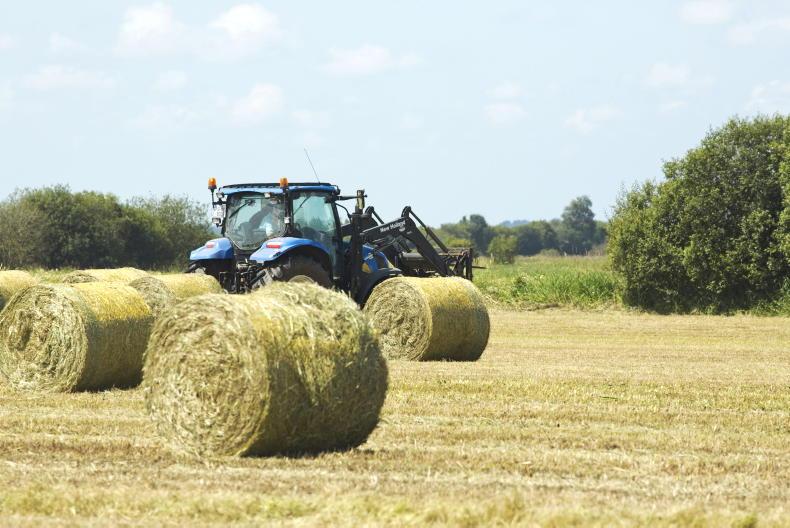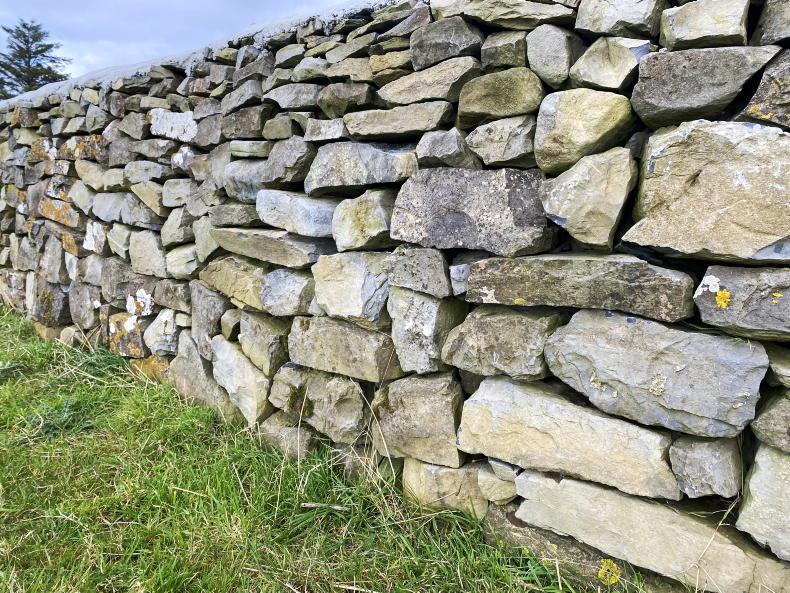Red clover and multi-species swards
Areas included in the 2025 Red Clover Silage Measure and the Multispecies Sward Measure (MSM) and declared on their 2025 Basic Income Support for Sustainability (BISS) application must be sown by 15 July 2025.
The red clover silage sward must be sown at the recommended seeding rates of at least 30kg/ha by 15 July 2025 with the sward successfully established by 30 September 2025. The seed mixture must include 4kg red clover for each 12kg pack. The balance of the seed mixture must contain either perennial ryegrass or hybrid ryegrasses and may contain some white clover.
A six-species mix is required for the MSM. The mix must contain at least two grasses, two herbs and two legumes from the varieties detailed in the terms and conditions. All perennial ryegrass and white clover varieties used must be included on the 2025 Department of Agriculture grass and white clover recommended list varieties.

Prices sought for hay range in the main from €30 to €40 per bale. / David Ruffles
Hay and silage trade
The end of the prohibited period for cutting meadows (1 July) under certain actions in the Agri-Climate Rural Environment Scheme is bringing more meadow/bales on to the market. Many deals are reported in the region of €8 to €10 per bale for the standing crop, with the purchaser harvesting the crop.
Prices being sought for better-quality grass outside of ACRES is in the region of €10 to €12 per bale, with some seeking up to €15 for reseeded grassland. In terms of bales, prices sought for 4x4 round bales of silage advertised as good quality are in the region of €30 to €40 per 4x4 round bale. There are some sellers seeking as high as €50 per bale but reports of deals completed at this price are rare.
It is a similar situation for hay with prices for 4x4 round bales in the region of €30 to €40 depending on quality and location. Small square bales are trading from €4 to €5 per bale.
Organic training courses
The National Organic Training Skillnet (NOTS) has also announced remaining course dates for QQI-accredited Organic Farming principles (Level 5) 2025 training. The locations and dates are as follows:
Kilkenny and Cork – 11, 12, 25 and 26 July.Donegal, Limerick and Wicklow – 8, 9, 22 and 23 August.Mayo – 8, 9, 15 and 16 August.Cavan – 15, 16, 29 and 30 August.Tipperary – 5, 6, 19 and 20 September.An organic training course must be completed by 1 October 2025 for new participants entering the conversion phase. The in-person course is €200 when booked through NOTS. See nots.ie for more.

No mortar is used between joints in the process of building dry stone walls.
Dry stone wall building
The National Organic Training Skillnet (NOTS) will hold two traditional dry stone wall building courses in July and August. The first of the two-day courses takes place in Rhode, Co Offaly (R35 Y2C1), on Saturday and Sunday, 19 and 20 July.
The second course will take place in Annagh, Oldcastle, Co Meath (A82 NH97) on Saturday and Sunday, 9 and 10 August 2025. Both courses run each day from 9.30am until 4.30pm. Participants will learn basic wall building techniques, how to repair existing stone walls, the benefits of walls on your farm and grant information for wall projects. The cost of the course is €140 (lunch included). See nots.ie for booking info, or call 087-399-8323.
Red clover and multi-species swards
Areas included in the 2025 Red Clover Silage Measure and the Multispecies Sward Measure (MSM) and declared on their 2025 Basic Income Support for Sustainability (BISS) application must be sown by 15 July 2025.
The red clover silage sward must be sown at the recommended seeding rates of at least 30kg/ha by 15 July 2025 with the sward successfully established by 30 September 2025. The seed mixture must include 4kg red clover for each 12kg pack. The balance of the seed mixture must contain either perennial ryegrass or hybrid ryegrasses and may contain some white clover.
A six-species mix is required for the MSM. The mix must contain at least two grasses, two herbs and two legumes from the varieties detailed in the terms and conditions. All perennial ryegrass and white clover varieties used must be included on the 2025 Department of Agriculture grass and white clover recommended list varieties.

Prices sought for hay range in the main from €30 to €40 per bale. / David Ruffles
Hay and silage trade
The end of the prohibited period for cutting meadows (1 July) under certain actions in the Agri-Climate Rural Environment Scheme is bringing more meadow/bales on to the market. Many deals are reported in the region of €8 to €10 per bale for the standing crop, with the purchaser harvesting the crop.
Prices being sought for better-quality grass outside of ACRES is in the region of €10 to €12 per bale, with some seeking up to €15 for reseeded grassland. In terms of bales, prices sought for 4x4 round bales of silage advertised as good quality are in the region of €30 to €40 per 4x4 round bale. There are some sellers seeking as high as €50 per bale but reports of deals completed at this price are rare.
It is a similar situation for hay with prices for 4x4 round bales in the region of €30 to €40 depending on quality and location. Small square bales are trading from €4 to €5 per bale.
Organic training courses
The National Organic Training Skillnet (NOTS) has also announced remaining course dates for QQI-accredited Organic Farming principles (Level 5) 2025 training. The locations and dates are as follows:
Kilkenny and Cork – 11, 12, 25 and 26 July.Donegal, Limerick and Wicklow – 8, 9, 22 and 23 August.Mayo – 8, 9, 15 and 16 August.Cavan – 15, 16, 29 and 30 August.Tipperary – 5, 6, 19 and 20 September.An organic training course must be completed by 1 October 2025 for new participants entering the conversion phase. The in-person course is €200 when booked through NOTS. See nots.ie for more.

No mortar is used between joints in the process of building dry stone walls.
Dry stone wall building
The National Organic Training Skillnet (NOTS) will hold two traditional dry stone wall building courses in July and August. The first of the two-day courses takes place in Rhode, Co Offaly (R35 Y2C1), on Saturday and Sunday, 19 and 20 July.
The second course will take place in Annagh, Oldcastle, Co Meath (A82 NH97) on Saturday and Sunday, 9 and 10 August 2025. Both courses run each day from 9.30am until 4.30pm. Participants will learn basic wall building techniques, how to repair existing stone walls, the benefits of walls on your farm and grant information for wall projects. The cost of the course is €140 (lunch included). See nots.ie for booking info, or call 087-399-8323.








 This is a subscriber-only article
This is a subscriber-only article











SHARING OPTIONS: